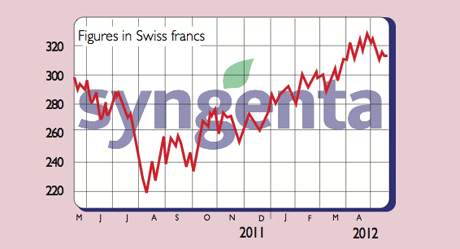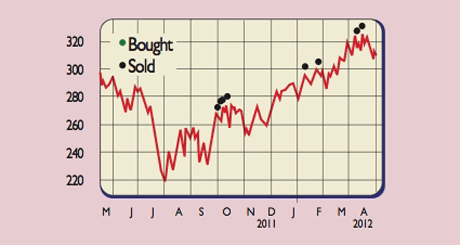Shares in focus: Syngenta - fertilising growth
Syngenta is well placed to benefit from the growing world population. So, should you buy its shares? Phil Oakley investigates.
Get the latest financial news, insights and expert analysis from our award-winning MoneyWeek team, to help you understand what really matters when it comes to your finances.
You are now subscribed
Your newsletter sign-up was successful
Want to add more newsletters?

Twice daily
MoneyWeek
Get the latest financial news, insights and expert analysis from our award-winning MoneyWeek team, to help you understand what really matters when it comes to your finances.

Four times a week
Look After My Bills
Sign up to our free money-saving newsletter, filled with the latest news and expert advice to help you find the best tips and deals for managing your bills. Start saving today!
Syngenta is well placed to benefit from the growing world population, says Phil Oakley.
The business
Syngenta is the world's leading provider of crop protection products. It sells herbicides, fungicides and insecticides that allow farmers to achieve higher crop yields by growing more food per acre. It also owns the world's third-largest seed business. Its main products are seeds for corn, soybean, sunflowers, sugar beet, oilseed rape, vegetables and flowers. Syngenta also sells professional products, such as items for lawn care, which are used by landscape gardeners and golf courses. The company had sales of $13.3bn in 2011.
The history
The firm was formed in 2000 when Novartis and AstraZeneca decided to merge their respective agribusiness and agrochemicals operations. But its roots can be traced back to the mid-18th century when JR Geigy Ltd began making chemicals and dyes in Basel, Switzerland.
MoneyWeek
Subscribe to MoneyWeek today and get your first six magazine issues absolutely FREE

Sign up to Money Morning
Don't miss the latest investment and personal finances news, market analysis, plus money-saving tips with our free twice-daily newsletter
Don't miss the latest investment and personal finances news, market analysis, plus money-saving tips with our free twice-daily newsletter
The foundations of today's Syngenta business were laid in the late 1920s when ICI opened an agricultural research station. At about the same time, Geigy began making insecticides. Over the next 60 years both businesses developed many of the seed products that are still used today while becoming part of bigger groups.
During the late 1990s, Novartis became a major player in the crop protection business after buying the business of Merck & Co, while over the last decade Syngenta has grown steadily. It has also bought a lot of other related businesses to build its global scale and enter fast-growing emerging markets.
The chief executive
Michael Mack has been chief executive since 2008. Prior to that he was CEO of Syngenta's seeds business and head of the North American crop protection division. His total compensation in 2011 was CHF8.5m.
While he is not supportive of overtly unenvironmental practices, such as deforestation to create farmland, he is an outspoken critic of organic farming. In 2009, he was reported as saying that a world adopting organic farming would lead to ecological disaster and that it was to food production what driving an SUV is to fuel economy.
Should you buy the shares?
Syngenta looks well placed to benefit from a growing world population. A finite supply of farmland, stresses on global water supplies and question marks over the sustainability of certain fertilisers mean that it will become more difficult to grow enough food to feed everyone. Each acre of farmland will be under pressure to produce more food.
Syngenta's crop protection products and seeds offer solutions to some of these challenges. A growing demand for food from emerging economies is also likely to cause food prices to increase over the next few decades. This should raise the value of Syngenta's products and allow it to keep growing sales and profits.
The company's strategy of offering an integrated seed and crop protection service is delivering good results and increasing its market share. Syngenta seems to squeeze out a good return from the $1.1bn it spends on research and development each year. This allows it to develop new leading products and also keeps the competition at bay.
So not only is Syngenta capable of further growth, but it should be able to keep earning good returns on the money it invests while generating plenty of surplus cash.
Syngenta's financial position overall is pretty strong, with a balance sheet that shows very modest levels of debt. Commodity bulls such as Jim Rogers constantly tout farmland as a good investment, but prices are high and consequently income returns are low. So at just over 15 times 2012 forecast earnings, buying Syngenta shares as a slightly less direct play on the same theme looks to be the better strategy.
The numbers

Share price: CHF 312
Market cap: CHF 29.2bn
Net assets (Dec 2011): $7.5bn
Net debt (Dec 2011): $1.2bn
P/e (current year estimate): 15.2 times
Yield (prospective): 2.8%
What the analysts say
Buy: 20
Hold: 11
Sell: 2
Average price target: CHF340.81
Directors' shareholdings

M Taylor: 12,723
M Mack: 26,096
J Atkin: 17,920
Get the latest financial news, insights and expert analysis from our award-winning MoneyWeek team, to help you understand what really matters when it comes to your finances.
Phil spent 13 years as an investment analyst for both stockbroking and fund management companies.
-
 Should you buy an active ETF?
Should you buy an active ETF?ETFs are often mischaracterised as passive products, but they can be a convenient way to add active management to your portfolio
-
 Power up your pension before 5 April – easy ways to save before the tax year end
Power up your pension before 5 April – easy ways to save before the tax year endWith the end of the tax year looming, pension savers currently have a window to review and maximise what’s going into their retirement funds – we look at how